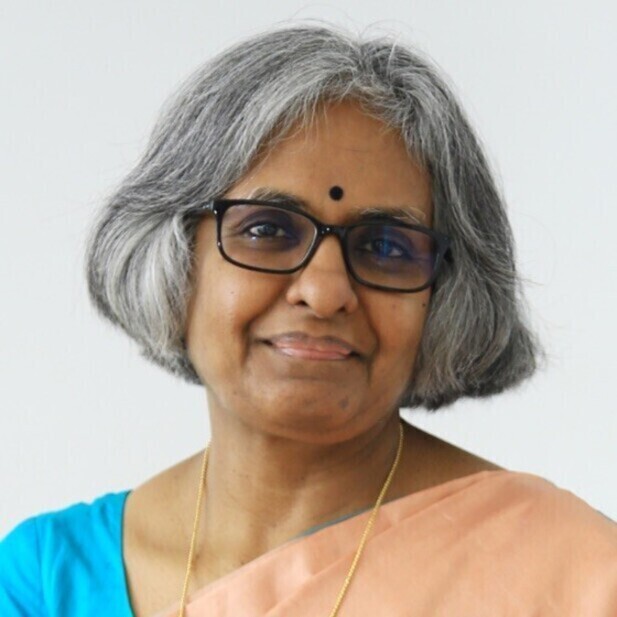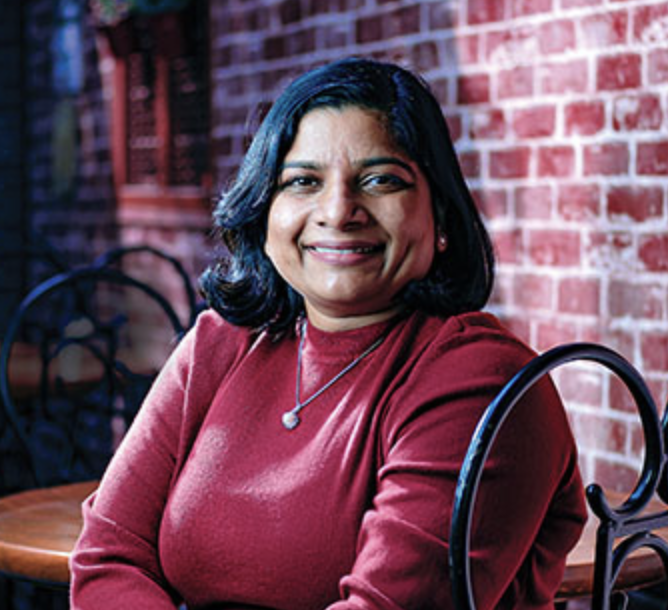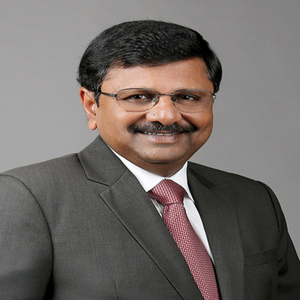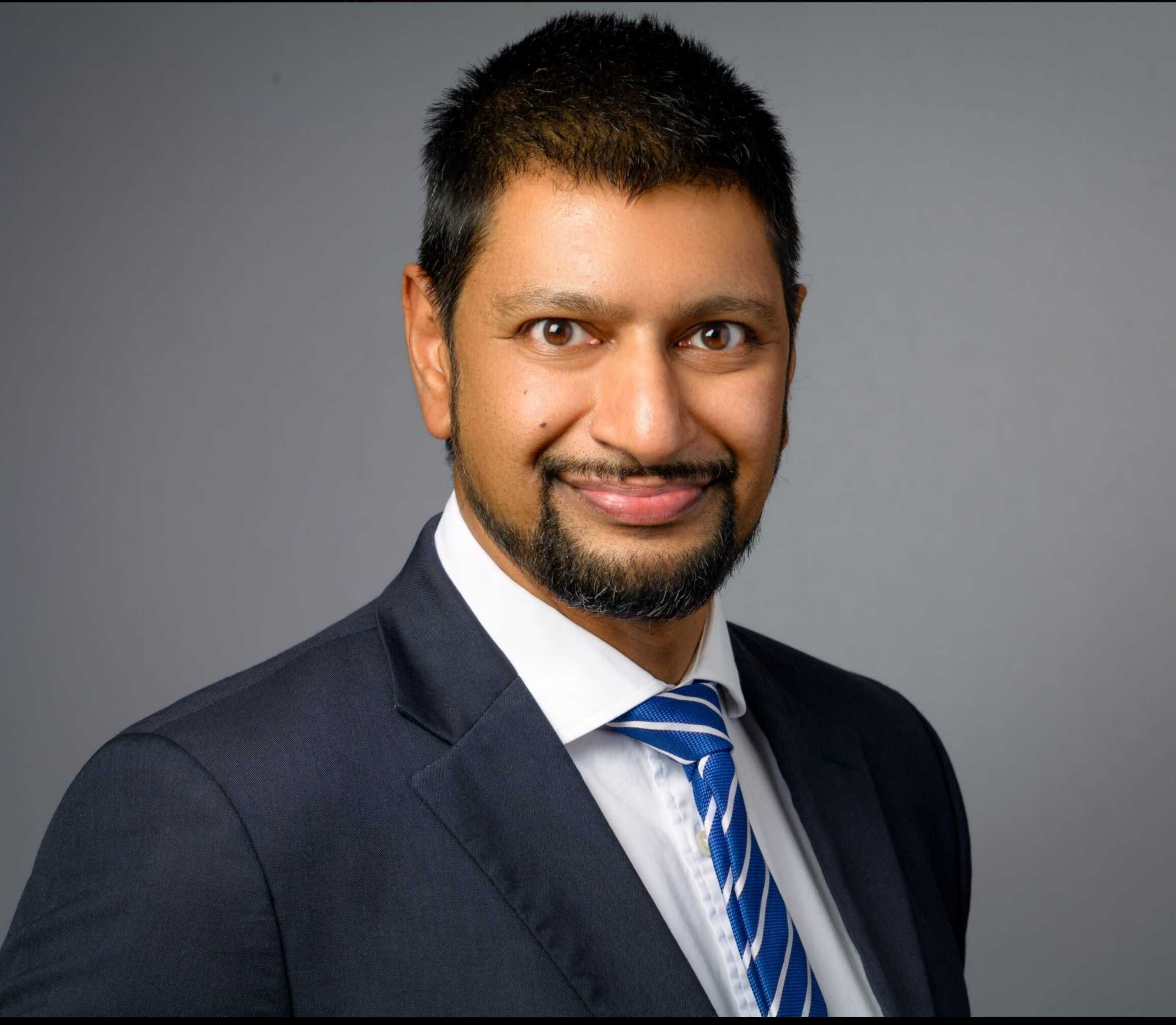In this episode of Nuclei's podcast, Ms Shalini Warrier, a seasoned professional with an impressive three decades of experience spanning diverse international banking landscapes, has a candid chat with the CEO & Founder of Nuclei, Mr Ankur Joshi.
Throughout her remarkable journey, she's navigated the ever-evolving financial tides, steering through challenges and embracing opportunities. An authority in her field, Shalini Ma’am has been a driving force in shaping the banking landscape, leveraging her extensive expertise to redefine industry standards.
This episode taps into her wealth of knowledge and insights. It's a masterclass in the evolution of banking, where every anecdote is a lesson, and every piece of advice is a gem.
- Journey from Management Trainee to Executive Director, Federal Bank
- Factors that made her hoose Brunei Over Singapore or Dubai
- Impact & Mitigation of the Kerala Flood Crisis
- Importance of Empathy During Tough Times
- Mentors, Books, and Decision-Making Frameworks: Insights for Aspiring Leaders
--Transcript Begins--
Ankur Joshi:
Hello, I'm Ankur Joshi, the founder and CEO of Nuclei. We are a fintech company where we work with banks like Federal Bank and deploy our fintech products across the industry. Today, I'm privileged to have Shalini Warrior, the ED of Federal Bank, on our podcast. Shalini Ma'am has been a constant support and mentor. It's a great honor for me to speak to her and have her on our podcast. Thank you, Ma'am, for your time, and welcome to the podcast.
Ms. Shalini Warrier:
Thank you, Ankur. It's my pleasure to be here. I know we've interacted extensively in the course of our work with Nuclei, this is a very different forum. I'm looking forward to the conversation.
Ankur Joshi:
Same here, Ma'am. We were discussing just before we started recording that we wanted to delve deeper into your journey—understand where you came from, how you approached it, the mental models and frameworks you used in the extensive decision-making that influenced your work across numerous countries and verticals. But before we explore that, we'd like to go back to your formative years, your family background, and what led you to follow this path. Could you delve deeper into that?
Ms. Shalini Warrier:
Thanks, Ankur. I come from a normal middle-class family, like many in India. To a large extent, my journey has been shaped by my family background—strong parents and a sister who's a devoted doctor. This upbringing has instilled three or four attributes in me from a very young age. Firstly, there's no substitute for hard work; it's a value ingrained in me. Secondly, there's a significant focus on discipline—maintaining a routine and ensuring discipline in everything we do. Thirdly, it's about recognizing and seizing opportunities for change, not letting them slip away.
Let me go back. I spent a significant part of my schooling in Chennai and completed a large part of my college education and chartered accountancy in Bangalore—these were the main places where I spent my formative years. I initially thought about becoming a teacher, but along the way, I gave up on that idea.
No disrespect to the profession—I still enjoy taking classes for people on the go, even today.
But then I realized that teaching was probably not my calling, neither from a personal nor a career perspective. In those days, reflecting on such matters was a luxury when you were young. The career choices were rather limited, leaning towards either engineering or medicine—typical paths that most people followed. Given that my sister was pursuing medicine, I wanted to explore a different path. I had reservations about being an engineer, not to discredit the profession, but I doubted it was the right fit for me.
It became clear that I had a natural flair for numbers and enjoyed delving into the analytics surrounding them. That realization led me to choose the path of becoming a chartered accountant. During my CA studies, I immersed myself in the profession. Even then, I was self-confident and resolute, knowing that I didn't want to practice as a chartered accountant in the traditional sense.
I always knew that financial services was where I wanted to be and that's how as soon as I qualified as a chartered accountant, I decided to join a bank and I joined Standard Chartered Bank.
Over the course of 25 years with the bank, I began my journey as a management trainee and as a management training, you go through the grind, performing tasks ranging from reconciling vouchers to conducting audits. I firmly believe that individuals entering a career should remain open-minded, especially during the initial 5 to 7 years, and be willing to explore various roles rather than sticking to predefined expectations.
I strongly believe in the principle of exploring diverse roles, and I put this into practice during my initial 5 to 7 years in the industry. It took me about five to seven years to realize where my true passion lay.
I found my niche in areas that involved a convergence of operations, technology, and business—anything that brought these elements together. This resonated with me because it not only encompassed operational and technical aspects but also involved significant people-related elements.
Despite my core competence in finance, being a chartered accountant, I opted for roles that extended beyond traditional finance.
I moved into operations, technology, and service delivery, which included aspects of customer service where I experienced both challenges and rewards from customer interactions. Standard Chartered, to its credit, presented me with numerous opportunities, and I was willing and able to pick up those opportunities.
The initial 15 years of my career were dedicated to Standard Chartered in India. Then, the first opportunity to work abroad presented itself. Standard Chartered, being a British bank with a global presence, offered opportunities across many countries. An opportunity arose to work abroad, specifically as the Chief Executive Officer of Standard Chartered's business in Brunei.
Choosing Brunei Over Singapore or Dubai: A Wise Decision
Ms. Shalini Warrier:
I must admit that when my boss initially spoke to me about it, I had no idea where Brunei was. I literally had to loop up the atlas to figure out the location to which the bank was sending me.
But then it was an opportunity, and I realized it was one outside the normal routine of assignments. Typically, in Standard Chartered, when people are posted from India, the first postings are usually in Singapore, followed by maybe Dubai. That's the usual trajectory because the bank has a significant presence in Singapore and Dubai. However, this was a bit offbeat and out of the ordinary. I took the time to learn a lot about Brunei, and I ended up there. I must admit, they were very defining moments.
I spent only about 18 months over there, but they were defining months because I was the first woman kind of chief executive.
I was the first South Asian, as normally the bank had posted Europeans and Britishers, etcetera. It was a small country, so you can visualize me being transported from Malabar Hill in Mumbai where I was at that time to a country with a total population of 300,000. That was the kind of contrast.
But the bank did a lot in terms of giving me training from a cultural perspective, from a political standpoint—understanding what the country is like. The bank did a lot, and I also invested a lot in learning more about the country, in embedding myself in the social fabric of the country. And I enjoyed the 18 months there. The bank has a fairly good business out there, which we grew, etc. The opportunity then came to do something different, which was again to go to a different kind of country, which was Indonesia.
Ankur Joshi:
So, I know you served across a lot of countries, but before that, I want to go a bit back and discuss your initial 5-7 years, where you worked across multiple verticals, right?
Generally, if I look at a lot of bankers, young bankers who have just joined the banks, they come, as you rightly mentioned, with a preconceived notion that credit is something where I want to go deep, or deposits or treasury. Was that a deliberate choice on your end to explore multiple verticals in order to diversify your skill set and keep a lot of options open for yourself, rather than becoming siloed into a particular vertical?
Ms. Shalini Warrier:
Ankur, you are right. Many people enter banking with the notion that Treasury is their desired field. As you mentioned, these are specialist areas. However, when I started, I made it clear to everyone, including my colleagues and bosses, that I wanted to experiment and try different things.
I began with something as seemingly mundane as an internal audit, where I learned my role. Soon after, I seized an opportunity to transition into the credit card business at Standard Chartered, which was establishing itself in that sector. This new venture was a significant opportunity, and within the credit card business, I took on various roles.
Once in that business, I realized my passion lay in dealing with multiple customers and handling a high volume of tasks, rather than being narrowly focused on a small number of high-value transactions.
In my mind, retail and anything related to it resonated more.
So, after about four or five years, I made a conscious choice to focus on retail. Within retail, I took on various roles, including business, operations, technology, customer service, and some finance.
So that's how it was in the first five years. It literally started as an experiment, which is what I encourage people to do. Every year, about 1000 probationary officers join Federal Bank. When I chat with them, I say, “Take the first 4-5 years in your stride, try various things.” The bank will throw opportunities your way—maybe in a rural branch, risk management, operations, or technology. Go ahead, do it with full gusto and devotion. You will learn something. Don't form a notion that says, 'I do want to be in corporate after four or five years.' It's fair. You'll start getting a much better idea. My journey was exactly that, and it was after 4-5 years that I decided on retail, which I really enjoy and find satisfying. Not to say I don't oversee some parts of wholesale in my current role. In my ops roles, I've done it, but I somehow get my kick out of retail.
Ankur Joshi:
So, I think the fact that you had such a wide view of the banking ecosystem—right across operations, technology, retail, wholesale, treasury—had a big role to play in you being made the CEO of SC Brunei, right?
Because a lot of times, we also internally speak about having diversified skill sets rather than being a single vertical specialist. So being a generalist rather than a specialist.
Ms. Shalini Warrier:
Yeah, it's always important, and particularly in the banking industry—I'm sure it's true for many other industries, but I know banking—to be aware of what's happening everywhere. You may choose to say that this is what I enjoy doing. Like I chose to say that retail is what I enjoy doing, but that doesn't mean I do not know enough about wholesale. I do not appreciate wholesale. I can understand it. And you're right, that's what makes you kind of move up into the role of a CEO or the kind of role I'm doing right now as an executive director, etcetera.
So yes, you're right about it. That makes it rounded, but it's also the individual concerned, right, Ankur? You have to look for those opportunities. The bank can only do this much. It's up to you if the bank is coming 5% of the way, The 95%.
Ankur Joshi:
Absolutely. And was the choice to work across multiple countries with Standard Chartered also with the same direction to diversify experience? Because when you go into different countries, as you rightly said, when you immerse yourself in the social fabric of that country, you acquire a lot of cultural nuances.
Ms. Shalini Warrier:
Yeah. So, again, two sides to it. Yes, it was a conscious decision on my part because I had reached the stage where I felt opportunities were getting a little stale, etc., and it would have been more of the same. So, there was some part of me seeking out new challenges and new opportunities, and the bank was also kind of open to giving me those opportunities.
So, for the bank, it was as much of a risk for them to take me and put me in Brunei as it was for me to go to Brunei. So, I think it was a meeting of both. And I think that's the point that I keep harping on in a lot of my discussions with people, saying it takes two to tango, it takes two to clap.
So yes, the bank will throw opportunities, but it's up to you to pick them up. If at that point I had chosen not to do that for whatever reason, I'm sure the bank would have given me something else.
But it may have gone a very, very different way. Today, I can very justifiably be proud of the learnings I've had from working in Brunei, working in Indonesia, working in, which, to some extent, being and the first couple of years being Brunei or Indonesia were very helpful, Ankur, because again, you know what happens is if you go to Singapore first, you tend to then think I must stay there itself, you know. So, I would have stayed in Singapore and probably taken a very, very different route. But the fact that I went to Brunei first and then to Indonesia and only then got to Singapore gave me a very, very different perspective. I acquired quite a lot of friends in both places, but more the ethos and philosophy of some of these countries, you know, that I can relate to even now.
Impact of the Kerala Flood Crisis on Banks and Users
Ankur Joshi:
Okay, okay. Also, because I believe Singapore and they were the safer choice, right? They were more in the comfort zone, in Indonesia outside the comfort zone. So that also accelerates your learning right?
As you rightly said that you learned a lot across this stuff.
One of the perceptions which gets formed around a lot of successful leaders and you have been extremely successful. You have had an extremely successful career and extremely successful leader, someone which I obviously look up to.
But the perception goes that whatever you touch turns to gold, right?
That's what the perception is, but I'm 100% sure you have had a lot of ups and downs along the way.
Right?
So and those are the pivotal points. Those are the points where you learn the lot. There are a lot of ups and downs, I want to delve deeper into some of the failures that you have had which have taught you big lessons and what is one of your favorite failures?
Because personally speaking, I love to fail because it teaches you a lot of things.
Because on those learnings you are able to then, you know, make sure that you don't repeat those mistakes in the future.
Ms. Shalini Warrier:
Yeah, so I think, I mean, I presume it's quite a cliche, right? Failure is a stepping stone to success. That's what people say, etcetera, but I think it's quite true. Now, you know, racking my brains to think of a couple of examples. I'll probably start with something more recent, like four years back. Then, you know, tell you about a couple of other instances. I have a couple of them on the professional side and a couple of them on the personal side, so I'll probably cover both of them.
First, on the professional side, I talked about August 2018 in my current role when I moved into Federal. I had been in Federal for about three years by August 2018 for the audience.
You might remember Kerala, one of its worst floods, and it was really bad, a once-in-100-years kind of an event, etcetera. The head office, which you visited, was literally at the epicenter of that flood, and really got impacted. So, I live over here. On the personal side, there was a lot of stuff with the house getting flooded, me and my family having to be rescued, etcetera, etcetera.
That was happening at one end. But the bank was also quite seriously impacted because of the data center and the data center having to be brought down. While we had disaster recovery capability and we had switched a lot to disaster recovery capability, the fact remains that when you have a crisis of this nature, it's not likely you'll be able to do everything according to the rule book.
So, we did have a situation where we had a lot of customer issues. We had a lot of feedback from customers that transactions were not getting processed, etcetera. You should see this in the context of the fact that it was proceeding Ramzan, which were big events for anybody in the calendar, particularly for people in Kerala. It was very, very focused on Kerala, as the rest of the country and abroad were not able to kind of recognize what the people were going through. Most of my people were impacted with all the floods. In the midst of that, there were these customer service issues, and we had a lot of partners not happy with us, etcetera.
I think that was literally very much of an eye-opener for us in the bank. For me personally, on what is really the whole capability of disaster recovery business continuity. It brought it into a very practical level because until then it had all been to some extent theoretical, and that learning, I think, is once in a lifetime, and I don't wish it on anybody. I don't wish it on ourselves, in order. But I think that was, we literally had to grapple with a lot of issues from a personal front, from a professional front. And since then, we've made a lot of progress.
Importance of Empathy During Tough Times
Ms. Shalini Warrier:
I believe one crucial learning, which I value professionally, is the significance of resilience and stability. In these uncertain times, these qualities matter a great deal. On a more personal note, after my stint in Brunei, I moved to Jakarta, taking on a role in a complex environment. I was seconded from Standard Chartered to a local bank called Permata, an amalgamation of five other banks during the South Asian crisis. This bank, formed by five banks, including Standard Chartered and a local Indonesian conglomerate, required substantial restructuring. We faced challenges such as staff layoffs, branch closures, and tough decisions. I, an import from Standard Chartered, lacked knowledge of the local language and culture. These were tough times, dealing with unions and people. The learning from this experience was that empathy plays a significant role in such situations. I invested time and effort in learning Bahasa Indonesia, the local language, through an immersion program and Saturday lessons. Failures and successes occurred, but the broader point was that any business recalibration requiring people impact needs empathy. This learning has been valuable.
Mentors, Books, and Decision-Making Frameworks: Insights for Aspiring Leaders
Ankur Joshi:
Certainly, especially recalling 2018, a challenging time. During such lows, historical figures, frameworks, or decision-making tools often guide us. Are there individuals, books, or authors who have significantly influenced your life and shaped your personality, frameworks, and mental models?
Ms. Shalini Warrier:
Regarding individuals, my parents and sister, typical for many, influenced me significantly. In a professional context, formal mentors, particularly my long-time boss and a close friend, played a crucial role. He instilled discipline, emphasizing scheduling priorities over prioritizing schedules and imparted strong people management skills. Understanding the team composition, empowering team members, and taking responsibility for both success and failure were key tenets. This mentor is my "3 a.m. friend." Learning from various people rather than copying is crucial.
In terms of books, I read an eclectic mix for relaxation, including fiction, from John Grisham to Jeffrey Archer. However, physical interactions with people provide irreplaceable learning experiences.
Ankur Joshi:
Great insights. Considering your emphasis on empathy and humility, what, in your opinion, defines a good leader? Besides empathy and humility, what skills are essential for effective leadership?
Ms. Shalini Warrier:
In addition to empathy and humility, an increasingly vital skill is the ability to unlearn, relearn, and learn continually. The changing world demands leaders to stay updated. Practicing reverse mentoring, seeking insights from younger team members, is a humble approach. Learning, accountability, and taking responsibility for the team's actions are critical attributes. Empowering the team is important, but a leader should recognize that ultimate accountability rests with them.
Ankur Joshi:
Wonderful insights. It has been a pleasure talking to you. As a concluding question, what is the kindest thing anyone has ever done for you?
Ms. Shalini Warrier:
Oh God, that requires some thought because life consists of many experiences, but some moments that stand out, I must admit, revolve around instances if I reflect on 2004. I lost my father after a brief illness; it wasn't a lengthy period. However, what was significant for me was a couple of friends and my boss flying all the way from Mumbai to a remote place in Kerala where this occurred. They spent an entire day with me amidst their busy schedules. The three of them took a flight, even though they had no clue about the location, as it was a remote place. Despite the absence of Google Maps and WhatsApp not being prominent at that time, this experience has stayed with me. It emphasizes that while I may not attend a wedding, in times of bereavement, when people truly need you, kindness matters a lot.
Another impactful experience relates to the floods. On the day the floods occurred, my 80-year-old mother, sister, and I had to be rescued from our home. We were taken to a convent, and the sisters there were exceptionally kind. Despite not knowing us, they ensured we had hot water, food, and a bed to stay. This was a tremendously kind gesture, and while there are many such examples, these two particularly stood out for me.
Ankur Joshi:
These examples are truly amazing. Thank you, Ma'am, for participating in this podcast. We genuinely appreciate the time you've dedicated to us. It was a wonderful and enlightening conversation. Once again, thanks for being a part of the podcast.
Ms. Shalini Warrier:
Thank you very much Ankur. And I love the format of the podcast and I love what you're doing with embedding this amongst the people.
So thank you very much for the opportunity and we'll be in touch. Thank you.
Ankur Joshi: Thank you Ma’am.
--Transcript Ends--




